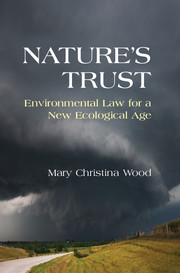Book contents
- Frontmatter
- Dedication
- Contents
- Preface
- Acknowledgments
- Part I Environmental Law: Hospice for a Dying Planet
- Introduction “You Can’t Negotiate with a Beetle”
- 1 “You Are Doing a Great Job”
- 2 Modern Environmental Law: The Great Legal Experiment
- 3 The Politics of Discretion
- 4 Behind the Grand Façade
- 5 The Administrative Tyranny over Nature
- Part II The People’s Natural Trust
- Part III The Public Trust and the Great Transition
- Notes
- Index
Introduction - “You Can’t Negotiate with a Beetle”
Published online by Cambridge University Press: 05 June 2014
- Frontmatter
- Dedication
- Contents
- Preface
- Acknowledgments
- Part I Environmental Law: Hospice for a Dying Planet
- Introduction “You Can’t Negotiate with a Beetle”
- 1 “You Are Doing a Great Job”
- 2 Modern Environmental Law: The Great Legal Experiment
- 3 The Politics of Discretion
- 4 Behind the Grand Façade
- 5 The Administrative Tyranny over Nature
- Part II The People’s Natural Trust
- Part III The Public Trust and the Great Transition
- Notes
- Index
Summary
You can’t negotiate with a beetle. You are now dealing with natural law. And if you don’t understand natural law, you will soon.
Oren LyonsOren Lyons’s statement refers to 4 million acres of Canadian forest wiped out by beetles now thriving in warmer winter temperatures as a result of planetary heating. Lyons has a knack for putting environmental problems into terms that are hard to argue with. A member of the Onondaga Nation Council of Chiefs and professor of American studies, he emphasizes “natural law,” a principle that has guided the indigenous approach to ecological management for thousands of years. As Lyons once put it in an interview:
The thing that you have to understand about nature and natural law is, there’s no mercy…. There’s only law. And if you don’t understand that law and you don’t abide by that law, you will suffer the consequence. Whether you agree with it, understand it, comprehend it, it doesn’t make any difference. You’re going to suffer the consequence, and that’s right where we’re headed right now.
The New Ecological Age
The planet we inhabit seems suddenly and violently out of balance. The consequences of humanity’s disregard for Nature’s laws find glaring reflection through the prism of ocean life. Four hundred “dead zones” now murk the world’s seas, collectively spanning tens of thousands of square miles. Off the coast of Oregon, a dead zone the size of Rhode Island resembles an underwater graveyard, with thousands of crab skeletons drifting in lifeless waters. In Moreton Bay, Australia, toxic fireweed can spread across the sea floor at a rate covering a football field every hour. When fishermen touch it, their skin breaks out into blistering welts, and their eyes burn and swell shut. Thousands of miles away on the Florida Gulf coast, a dreaded red tide visits once a year and persists for months. Ocean breezes carry toxic wafts inland to waterfront communities, sending victims to the hospital with pneumonia, asthma, and bronchitis.
- Type
- Chapter
- Information
- Nature's TrustEnvironmental Law for a New Ecological Age, pp. 3 - 18Publisher: Cambridge University PressPrint publication year: 2013



